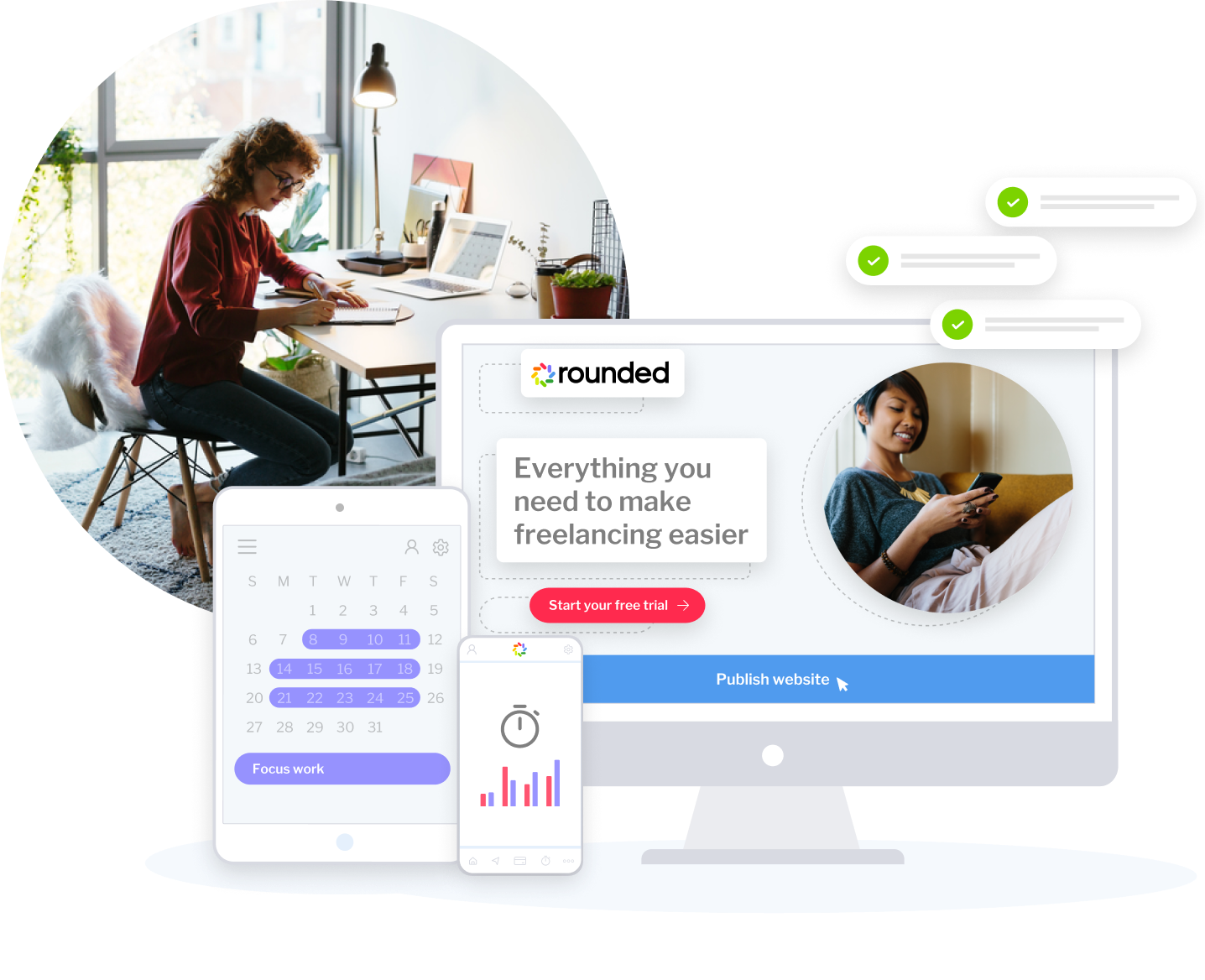Launching Your Freelance Career
The freelancers featured on this page put together all the stuff they wish they’d known when they started. Get tips on what your first steps should be, how to grow your network, and how to get into the right mindset to launch a freelance career.

Plan your pipeline. By focusing on your pipeline for the months ahead, you can better manage your cash flow so there are few or no surprises. I use draft invoices in Rounded as a way to see what the next few months hold and give me a heads-up if I need to look for more opportunities, or am on track for now. The dashboard is a great way to see it all in an instant and make the decisions I need to.

Time management is everything. When I first started freelancing, I wish someone would have told me this. As a freelancer, your time is your most valuable asset. Early on, I wish I would have tracked my time, blocked my calendar for focus work, forecasted to know how much time I have for client work each month, and done a better job reflecting regularly on where my time was going.

Register your business and open a bank account on day one. You never know what the future will bring or when you’ll need to prove your employment (for example, buying a piece of property). The proof is in the paperwork.

As you’re waiting for your first clients to come in, use any downtime as an opportunity to market your business, get your processes in order, and upskill, because when the work does come, it will be in a torrent. You'll be thankful for your organisation in the leaner times!

Have a backup plan. I almost always tell people to have a full-time role before they start freelancing. You need that soft backup in case of your famine periods. When you have a consistent stream of clients and have built your network up, then you can go full-time.

Have confidence in yourself and your product. I suffered from 'Imposter Syndrome' and put off the launch of my business because of it.

Have fun! Business no longer needs to be stuffy, formal, or boring. Don't be afraid to show the world who you are and what you stand for. Be as authentic as possible as this will help you stand out. Work on forging genuine connections and relationships with other business owners and your clients. But make sure you enjoy everything you do - as this shines through your marketing and it WILL win clients.

Back yourself. Don't let a lack of confidence deter you from starting. You don't need to do another course or build a website or do whatever is on your to-do list before you start. The feedback you get when you start is the best confidence boost you will get.

Successful people who have come before us have failed to flag just how much time it takes for momentum to build. It really does take work daily. Build the habits, get an accountability buddy, and keep plugging away and trust it will pay off.

I was once asked, if you were starting a new business, knowing what you know now, where would you start with content?
I'd start with: voice guidelines to play with, messaging to experiment with, and a website to sell with.
When you’re starting out, play and experimentation are important. It's what lets you see what people respond to, and what falls flat.

Ditch your employee mindset ASAP. You run a business now. Know your expenses, know the value you provide, and don't under-sell yourself.

Don't waste time over-planning, researching or perfecting too much. You may spend weeks finessing your logo, mission statement, portfolio or website but if you never publish it, you'll never make tangible progress. If it's 80% there – launch it – and improve it later.

You'll want to say yes to everything in the beginning, but the sooner you can get specific on what you do and who you do it for (ie. your ideal client) you'll be more likely to be saying yes to the kind of work you actually want to do. Because if you're everything to everybody, you're not ever going to stand out or connect with your ideal customer.

Don't be afraid to use a professional website designer. One of the things that can make or break your freelance business is the quality of your website design. A good designer will help ensure that every aspect of your site's design—from font choice to color palette—is cohesive and professional, so that potential clients are confident that they're engaging the freelancing services of a true expert.
Try to get as many retainers as you can to ensure a steady state of income.

While I'm a big fan of jumping in the deep end, it's worth giving some thought to your systems and processes. Make the job easier for yourself by setting up systems, tools and templates to help you do your work more efficiently. A bit of time spent on this will pay dividends in the long run. It will make your workflow so much easier and will free up your mind to be able to focus on your creative outputs. If you need help in this area (and are in a position to do so), find a Virtual Assistant to help you. A good VA can be worth their weight in gold!

Seek out a coach or expert in your field of work to learn about starting your own business, the infrastructure needed, rookie errors, shortcuts, and must-haves. The time and struggle this will save you will make the expense worthwhile.

Focus your energy on where your freelancing business is differentiated. Occupy your time with the services that are core to your business and either buy or hire out services for the rest. I spent a lot of time in my early days as a freelancer on things that didn't deliver a relevant, competitive advantage for my business and it got me stuck. I was trying to be everything for every one of my clients. In the end, that's a great way to sink in the quicksand!

Discipline and consistency are the keys to successful freelancing.

When I first set up my business I engaged two people to help me: my business coach to coach me on networking and marketing of my business and a Life Coach to coach me on my mindset. I owe my success to both of these people, who gave me the support and guidance I needed to start my freelance career.


-p-1600.jpeg)
-p-1600-(1).jpeg)
.jpeg)





